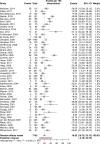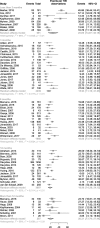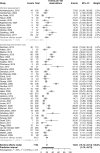Prevalence of post-traumatic stress disorder symptoms in adult critical care survivors: a systematic review and meta-analysis
- PMID: 31186070
- PMCID: PMC6560853
- DOI: 10.1186/s13054-019-2489-3
Prevalence of post-traumatic stress disorder symptoms in adult critical care survivors: a systematic review and meta-analysis
Abstract
Background: As more patients are surviving intensive care, mental health concerns in survivors have become a research priority. Among these, post-traumatic stress disorder (PTSD) can have an important impact on the quality of life of critical care survivors. However, data on its burden are conflicting. Therefore, this systematic review and meta-analysis aimed to evaluate the prevalence of PTSD symptoms in adult critical care patients after intensive care unit (ICU) discharge.
Methods: We searched MEDLINE, EMBASE, LILACS, Web of Science, PsycNET, and Scopus databases from inception to September 2018. We included observational studies assessing the prevalence of PTSD symptoms in adult critical care survivors. Two reviewers independently screened studies and extracted data. Studies were meta-analyzed using a random-effects model to estimate PTSD symptom prevalence at different time points, also estimating confidence and prediction intervals. Subgroup and meta-regression analyses were performed to explore heterogeneity. Risk of bias was assessed using the Joanna Briggs Institute tool and the GRADE approach.
Results: Of 13,267 studies retrieved, 48 were included in this review. Overall prevalence of PTSD symptoms was 19.83% (95% confidence interval [CI], 16.72-23.13; I2 = 90%, low quality of evidence). Prevalence varied widely across studies, with a wide range of expected prevalence (from 3.70 to 43.73% in 95% of settings). Point prevalence estimates were 15.93% (95% CI, 11.15-21.35; I2 = 90%; 17 studies), 16.80% (95% CI, 13.74-20.09; I2 = 66%; 13 studies), 18.96% (95% CI, 14.28-24.12; I2 = 92%; 13 studies), and 20.21% (95% CI, 13.79-27.44; I2 = 58%; 7 studies) at 3, 6, 12, and > 12 months after discharge, respectively.
Conclusion: PTSD symptoms may affect 1 in every 5 adult critical care survivors, with a high expected prevalence 12 months after discharge. ICU survivors should be screened for PTSD symptoms and cared for accordingly, given the potential negative impact of PTSD on quality of life. In addition, action should be taken to further explore the causal relationship between ICU stay and PTSD, as well as to propose early measures to prevent PTSD in this population.
Trial registration: PROSPERO, CRD42017075124 , Registered 6 December 2017.
Keywords: Critical care; Intensive care units; Meta-analysis; Post-traumatic stress disorder; Prevalence; Systematic review.
Conflict of interest statement
The authors declare that they have no competing interests.
Figures




References
-
- Jackson JC, Pandharipande PP, Girard TD, Brummel NE, Thompson JL, Hughes CG, et al. Depression, post-traumatic stress disorder, and functional disability in survivors of critical illness in the BRAIN-ICU study: a longitudinal cohort study. Lancet Respir Med. 2014;2:369–379. doi: 10.1016/S2213-2600(14)70051-7. - DOI - PMC - PubMed
-
- American Psychiatric Association . Diagnostic and statistical manual of mental disorders. 5. Arlington: American Psychiatric Publishing, Inc.; 2013.
-
- Javidi H, Yadollahie M. Post-traumatic stress disorder. Int J Occup Environ Med. 2012;3:2–9. - PubMed
Publication types
MeSH terms
LinkOut - more resources
Full Text Sources
Medical
Molecular Biology Databases
Research Materials

